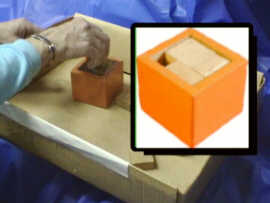 |
Follow up Web pages for Oregonians for Rationality booth Children's Pavilion Email webmaster |
 |
 |
Follow up Web pages for Oregonians for Rationality booth Children's Pavilion Email webmaster |
 |
Science is not what it seems at first glance.
|
Three centuries and a few decades ago, Isaac Newton realized that human beings had, ever since humans began, missed recognizing a few very simple relationships that describe how things interact with each other. These relationships became known as “Newton’s Laws of Motion.” Then, not long ago, a few human beings used those relationships to fling a space probe out into space so that it slipped nicely through a gap in the rings of Saturn to rendezvous with one of Saturn‘s moons. Nice shot, as they say on the basketball court. |
A few decades ago a university physics professor realized that 95% of his physics students who had passed his elementary physics course—which relied a lot on Newton’s laws—were still missing that crucial understanding which could show those students how the space probe people managed to make that spectacular shot. The first of the laws says that motion does not imply a force to produce the motion. But 95% of his students—following a lifetime of experience with unnoticed earthly friction that slows everything down—still believed that motion does imply some propelling force. MORE No useful understanding there! |
Something strange has been noticed about the textbooks used to teach the elementary concepts. Nobel laureate Richard Feynman discovered that the 17 shelf-feet of texts he had been asked to rate by the state of California were “universally lousy”: “Everything was written by someone who didn’t know what the hell he was talking about.” * And at the start of the 21st century, a careful study of textbooks used in middle school science courses found them no better: “Not one of the books we reviewed reached a level that we could call ‘scientifically accurate’ as far as the physical science contained therein.” ** “Universally lousy” is not good enough! “We must, and we can, do better.” *** |
| Not much has changed in three centuries (plus). We still need second glances before we really understand. We need to really understand it before we can use our knowledge. We must do better. | *Surely You’re Joking, My Feynman,
pp 262 – 276..
**See John Hubisz, in Physics Today, May, 2003, p 50 – 54. ***Dr. Seuss said that. Life is a search for the Platinum
Plover Egg
|
|
| Puzzle
solving can bring understanding
when learning fails us. |
The discovery of solutions to great problems does not guarantee that the problems will be resolved in any widespread way. Especially when many people don’t really understand those solutions. |
|
What "obvious" things are we not seeing? Meet
the person from Porlock.
|